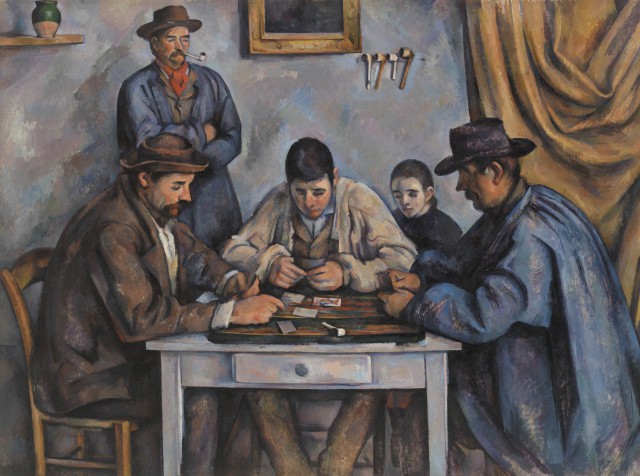
THE DAILY PIC: This is Paul Cézanne’s great Card Players, from around 1890, permanently on view at the Barnes Foundation in Philadelphia. artnet News recently posted a five-minute video culled from the hour that I spent in front of the piece with Christian Viveros-Fauné, my partner-in-criticism. I’m coming back to the painting now because one hour wasn’t nearly enough time to unpack this magnum opus. For instance, in front of the painting I got the germ of an idea I’ve been mulling since: If this painting seems the rare work that fully deserves the title of “masterpiece”, maybe that’s because it declares itself to be just that, so subtly that we can’t resist. The gold cloth that Cézanne hangs at top right of his picture–and that you have to assume was not really part of the card room’s décor–acts as an echo of the gilt frames that Old Master pictures have always received. (The effect is more powerful live at the Barnes, where Cézanne’s piece really is framed in gold.) Deeper into the picture, the royal-blue robes of the card-player at front right, and then the scarlet kerchief of the man at rear left, refer back to all those Renaissance pictures that proclaim the glory of the Virgin Mary by depicting her with the fanciest paints. Even the rounded folds in the clothes of Cézanne’s peasants evoke the monumental, “classical” robes that artists such as Fra Bartolomeo and Raphael started giving to sacred figures in the years after 1500. By transferring this Old Master “morphology” into his deeply modern picture, Cézanne gets us to understand that its pedigree and novelty can’t be pulled apart.
Looking at the work once again, I start to feel as though Cézanne’s modern figures have come tumbling out of the gold-framed void that’s at the center of his canvas, and that stands for painting’s past.
For a full survey of past Daily Pics visit blakegopnik.com/archive.